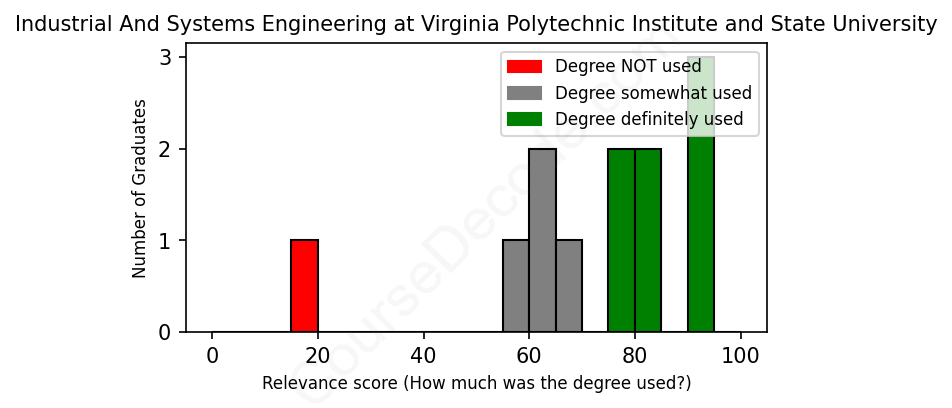
First, some facts. Of the Industrial And Systems Engineering graduates from Virginia Polytechnic Institute and State University we've analyzed , here's how many have used (or NOT used) their degree in their career:

These are estimates based on AI analysis of 12 LinkedIn profiles (see below).
The verdict? Slightly above average. Overall, with an average relevance score of 71%, Industrial And Systems Engineering graduates from Virginia Polytechnic Institute and State University have a slightly higher likelihood (+4%) of finding work in this field compared to the average graduate across all fields:
And for comparison, here's the chart for all profiles we've looked at across all degrees.
Also, after graduating, only 25% of these graduates have pursued further education other than another Bachelor's degree (such as a Masters degree or other), compared to the average across all profiles of 35%. This suggests a Bachelors degree is enough for most Industrial And Systems Engineering graduates, and it's normal to look for work straight after graduation.
See the details:
|
Relevance score: 17% We think this person has NOT gone into a career related to their degree. We think this person has NOT gone into a career related to their degree.
DEGREE INFOGraduated in 2015 from Virginia Polytechnic Institute and State University with a Bachelors Degree in Industrial And Systems Engineering. No other secondary education since. JOB HISTORY SINCE GRADUATIONProduction Supervisor Hillphoenix Oct 2015 - Dec 2016 Value Stream Manager  Hillphoenix Jan 2016 - Apr 2017 Lead Bartender  Buffalo Wild Wings Jun 2017 - Present Sales Development Representative  Conquest Graphics Sep 2020 - Present ABOUTExperienced Operations Manager with a demonstrated history of working in the e-commerce and service industries. Livin' the dream! Just a guy trying to help anyone with whatever they need!B.S. Industrial and Systems Engineering at Virginia Tech '15 |
The top 10 most common jobs done by the graduates we've analyzed (ranked most common to least) are:
From the analysis of LinkedIn profiles of graduates from Virginia Tech with degrees in Industrial and Systems Engineering, it's clear that many commonly take on roles as business analysts, consultants, and project managers. A lot of these jobs, especially in the consulting and management sectors, involve analytical thinking and systems organization but don't always dive deep into engineering specifics. For example, positions at companies like Deloitte or Amazon often emphasize project and operations management, which are related to the skills learned in their degree, yet they don't typically require advanced engineering knowledge on a daily basis.
When we look closely, we see that some roles, like Industrial Engineer or Process Engineer, do make direct use of the engineering principles from their education. These positions often relate directly to systems optimization and efficiency, which is at the heart of Industrial and Systems Engineering. However, a significant number of jobs listed in the profiles seem to lean more towards business strategy and project management, where only some aspects of their engineering background are applied. So, while there are definitely paths that utilize their degree directly, many graduates end up in roles that are somewhat related but lack the core engineering focus. Overall, it appears that while graduates find success in various fields, the relevance to their Industrial and Systems Engineering training can vary widely depending on the specific job and company.
Here is a visual representation of the most common words in job titles for Industrial And Systems Engineering graduates (this is across all Industrial And Systems Engineering graduates we've analyzed, not just those who went to Virginia Polytechnic Institute and State University):

Graduates from Virginia Tech’s Industrial and Systems Engineering program often kick off their careers with roles that emphasize analytics and operational management. For instance, many start as analysts—whether it’s in logistics, business applications, or operations—leveraging their background to help organizations optimize processes and decision-making. Over the first couple of years, it's common to see them developing their expertise in consulting roles or in-house positions at major companies like Deloitte and Amazon. Those initial jobs typically set the groundwork for more specialized roles in project management, business analysis, or operations leadership as they gain experience.
As they progress five to ten years down the line, many graduates are moving into senior positions that reflect their growing expertise. This can range from managerial roles in significant organizations such as Amazon to leadership positions at consulting firms or tech companies. Some even take entrepreneurial routes or transition into more technical roles as they carve their niche in the industry. Overall, it seems that the career trajectories for these graduates tend to be quite promising, with a solid prevalence of relevant positions within Industrial and Systems Engineering fields. While a few individuals stray into more unrelated areas, most appear to leverage their degree to secure stable and rewarding careers.
Getting a Bachelor’s degree in Industrial and Systems Engineering can be pretty challenging, especially at a school like Virginia Tech, which has a solid reputation in engineering. You’ll dive into a mix of math, statistics, and engineering principles, and things can get intense with projects and teamwork involved. It’s definitely not the easiest degree out there, since it requires both problem-solving skills and a good dose of analytical thinking. But if you’re passionate about optimizing systems and enjoy working through complex issues, you might find it rewarding despite the workload. Just be prepared for some late nights and a fair bit of stress!
Most commonly, in the LinkedIn profiles we've looked at, it takes people 4 years to finish a Bachelor degree in Industrial And Systems Engineering.
Looking at the jobs of these Industrial and Systems Engineering grads from Virginia Tech, it seems like they’ve landed some solid positions over the years, especially those who stayed in consulting or moved up within companies like Amazon and Deloitte. The graduates who ventured into roles at big names like Toyota, Bank of America, and Honeywell seem to have good earning potential as they progress in their careers, climbing the corporate ladder and taking on managerial roles. On the flip side, some paths, like that lead bartender gig, might indicate a bit of a struggle to find that ideal engineering role, but overall, it appears that a decent chunk of them are likely making good money, which is pretty encouraging if you're considering following a similar path!
Here is a visual representation of the most common words seen in the "about" section of LinkedIn profiles who have a Bachelor degree in Industrial And Systems Engineering (this is across all Industrial And Systems Engineering graduates we've analyzed, not just those who went to Virginia Polytechnic Institute and State University). This may or may not be useful:

Here are all colleges offering a Bachelor degree in Industrial And Systems Engineering (ordered by the average relevance score of their Industrial And Systems Engineering graduates, best to worst) where we have analyzed at least 10 of their graduates:
| College | Score | Count |
|---|---|---|
 The Ohio State University The Ohio State University
|
88 | 17 |
 Virginia Tech Virginia Tech
|
85 | 12 |
 Georgia Institute of Technology Georgia Institute of Technology
|
78 | 13 |
 University of Florida University of Florida
|
75 | 13 |
 Virginia Polytechnic Institute and State University Virginia Polytechnic Institute and State University
|
71 | 12 |